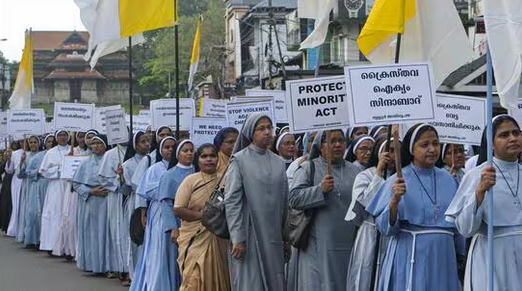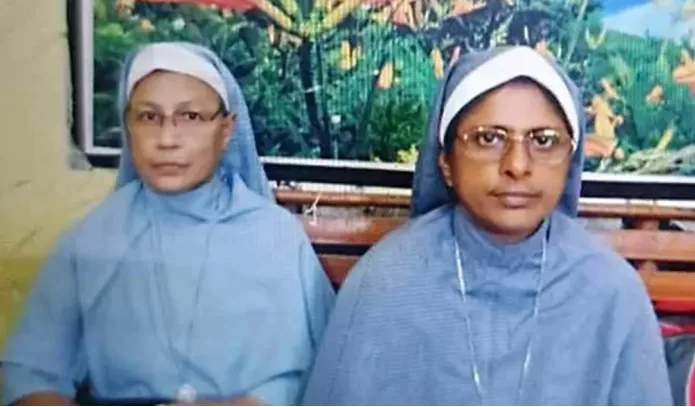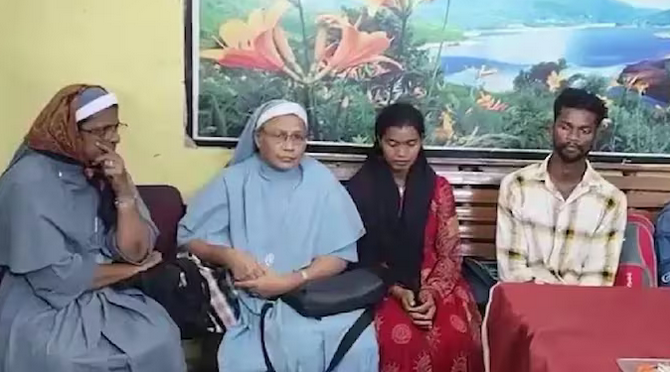Chhattisgarh NIA Court Hearing & Reserved Bail Verdict
On July 29, 2025, the NIA Special Court in Jagdalpur concluded intense arguments and reserved its order on the bail pleas of Sister Preethi Mary and Sister Vandana Francis, two Kerala-based nuns arrested under charges including human trafficking, forced conversion, and anti-national activity. The judicial decision is expected imminently.

Timeline & Legal Background
- July 25: Nashik–assisted arrest at Durg railway station after Bajrang Dal activists accused the nuns of forcibly converting three tribal girls. The girls, aged under 23 and already Christians, were allegedly traveling for nursing jobs with parental consent.
- July 30: The Durg Sessions Court denied bail, citing lack of jurisdiction, and directed the case to be heard by a designated NIA Special Court in Bilaspur under the NIA Act (2008).
Charges & Legal Complexity
The FIR includes:
- Human trafficking (IPC/BNS Section 143)
- Forced conversion (Chhattisgarh Freedom of Religion Act)
- Anti-national activities under BNS Section 152
The conversion allegations were reportedly added after sustained pressure from Bajrang Dal activists. Supporters claim the girls were traveling voluntarily with proper documentation.

Legal Representation & Proceedings
Defense lawyers argued:
- Valid documentation and explicit parental consent
- Absence of coercion or conversion attempt
- Wholly humanitarian work by the nuns
Prosecution countered with:
- Risk of evidence tampering
- Seriousness of trafficking charges
- Influence from extremist organizations aiming to derail communal harmony
The judge heard both sides extensively before reserving judgement.
Political & Social Uproar
Protests & Political Responses:
- Kerala Congress, CPI(M) & UDF staged protests across Kerala (Thiruvananthapuram, Kochi, Thrissur), alleging constitutional rights violations.
- CPM called the case a reflection of Sangh Parivar’s communal agenda and launched protest programmes.
- Kerala BJP leader Rajeev Chandrasekhar termed the arrest a “misunderstanding” and assured bail soon; he claimed procedural lapses led to confusion.
- Union Home Minister Amit Shah reportedly assured Kerala MPs the Centre would not oppose bail and favoured transfer back to the sessions court for a faster remedy.

Conditions in Custody & Medical Concerns
Suffering from chronic illnesses like arthritis, both nuns remain in Durg Central Jail, without adequate medical treatment. Delegations led by Brinda Karat, Annie Raja, and Kerala MPs claimed family members were intimidated by Bajrang Dal protestors outside the jail.
Early hearing conditions were described as coercive: Bajrang Dal members reportedly conducted interrogations in the presence of indifferent railway officials and police.
Broader Implications
Religious Freedom & Minority Rights:
Civil society and opposition allege misuse of anti-conversion and trafficking laws to persecute minorities. Nuns were targeted despite carrying valid documents and working in line with NGO mandates.
Political Fallout in Kerala:
The case puts Kerala BJP in dissonance: while national leaders engage damage control, local activists raise communal suspicion over its electoral implications in minority-heavy Kerala.
Case Timeline
| Date | Event |
|---|---|
| Jul 25, 2025 | Arrest of two nuns and tribal girls at Durg railway station |
| Jul 30, 2025 | Sessions Court rejects bail, refers case to NIA court |
| Jul 29, 2025 | NIA court hearing in Jagdalpur; bail reserved |
| Jul 30–Aug 1 | Political delegations & protests in Kerala and Delhi |
| Aug 1, 2025 | Rajeev Chandrasekhar assures procedural misunderstanding corrected |
| Aug 2–3, 2025 | Opposition protests and demands for central intervention |
Why This Case Matters
- Legal precedent on NIA’s jurisdiction over alleged trafficking and conversion cases
- Political friction between state BJP units and Kerala leadership
- Religious liberty debate in tribal-dominated regions
- Spotlight on misuse of laws against minorities for communal polarization
Conclusion: A Case That Echoes Beyond the Courtroom
The Chhattisgarh NIA court’s reserved verdict on the Kerala nuns’ bail plea isn’t just a legal decision—it’s a test of India’s judicial integrity, religious freedom, and minority rights. With allegations of human trafficking and forced conversions being weighed against claims of humanitarian work and constitutional liberties, the nation watches closely.
As politics, religion, and law intersect in this high-stakes case, the outcome will influence not only the future of Sister Preethi Mary and Sister Vandana Francis, but also the larger narrative of how India treats its religious minorities in sensitive tribal regions.
The final order—expected soon—will either reinforce trust in due process or raise deeper questions about the politicization of justice, especially in cases involving faith, tribal rights, and central investigative agencies like the NIA.
👉 Stay tuned for the verdict update and ongoing coverage only on Vishwakhabar.com.